If the odds of a Real Valladolid result weren’t great coming into the game, Clément Lenglet’s third-minute goal certainly didn’t help their prospects.
Though the guests managed to equalize in the 15th minute, Barcelona ran away with a 5-1 victory in their La Liga matchup. Lionel Messi recorded a brace and he was joined on the scoresheet by Luis Suárez and Arturo Vidal.
This tactical analysis will examine how Barcelona’s tactics allowed them to unbalance the Valladolid defence and create opportunities to run in behind. We’ll also provide an analysis of how Valladolid’s stagnant attack routinely failed to look beyond the safe and short passes, even in instances of numerical superiority and great positioning.
Lineup
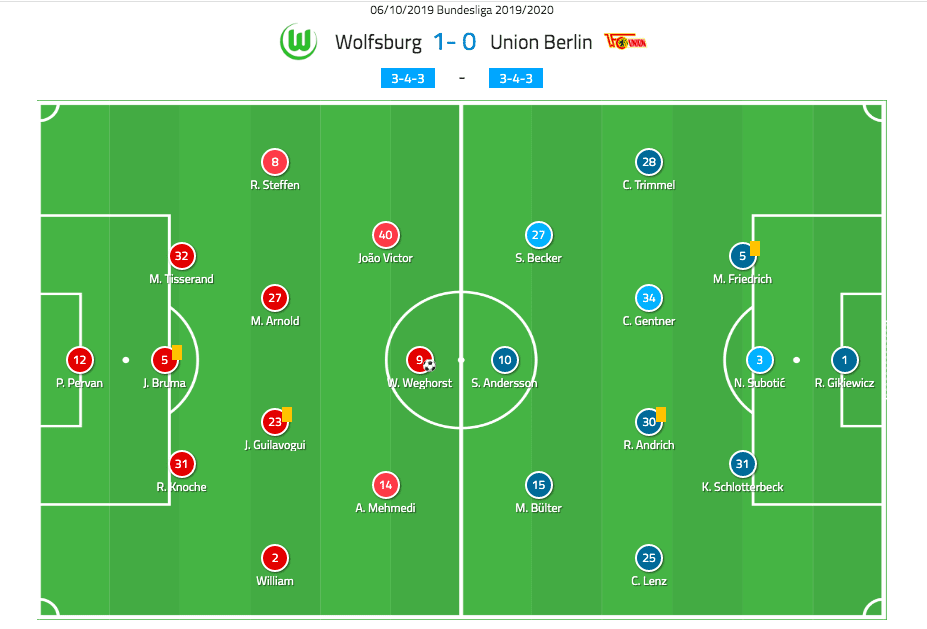
Ernesto Valverde set out his Barcelona side in their traditional 4-3-3. Sergio González countered with a 3-4-1-2, hoping to outnumber Valverde’s men centrally and account for runs from the midfield.
Ansu Fati received an early birthday present, earning the start on the left just days before his 17th birthday. Suárez and Messi rounded out the forwards while the midfield featured Sergio Busquets in his typical hold midfielder role with Frenkie de Jong and Vidal in front of him.
The visitors had Sergi Guardiola and Waldo Rubio played up top. They were tasked with providing high targets and limiting the attacking influence of Gerard Piqué and Lenglet. Óscar Plano operated in the space behind his forwards while Pedro Porro and Nacho, whose first-half injury led to Mohammed Salisu’s introduction, patrolled the wings. When Valladolid defended in their defensive half, Porro and Nacho dropped in line with Joaquín Fernández, Kiko Olivas and Federico Barba.
Barcelona unbalances the Valladolid defence
Stats show Barcelona entered this game averaging 1.74 xG per game, allowing 1.35 xG. Messi’s absence surely impacted the results and performance, but there’s no questioning that the quality of the chances needed to improve. Greater fluidity in attack brings the added benefit of forcing opponents to commit more numbers to defend in deep areas, limiting their opportunities going forward.
That’s exactly what happened in this game. Barcelona managed to pin Valladolid back, holding the away side to a .88 xG for the game. Despite the numbers Valladolid committed to defence, Barcelona managed to keep their opponents off-balance for most of the game, creating numerous chances right down the middle. Given that Valladolid set out is a conservative formation to protect Zone 14 (top of the 18 and central), that’s where Barcelona directed their entry into the box. That commitment to attacking the central channel produced nine shots on target and a statistic of 2.43 xG.
Barcelona’s emphasis on developing play in the wings, especially through Jordi Alba, de Jong and Fati on the left, consistently forced Valladolid to overcommit numbers to that side of the field. Valladolid was able to make the field compact, but it’s the vertical compaction that created issues.
Busquets and Vidal managed their space well, typically finding large pockets of space to receive and facilitate the switch of play. As the defence moved both horizontally and vertically, Barcelona found gaps in Valladolid’s movement and exploited the space with lethal precision.
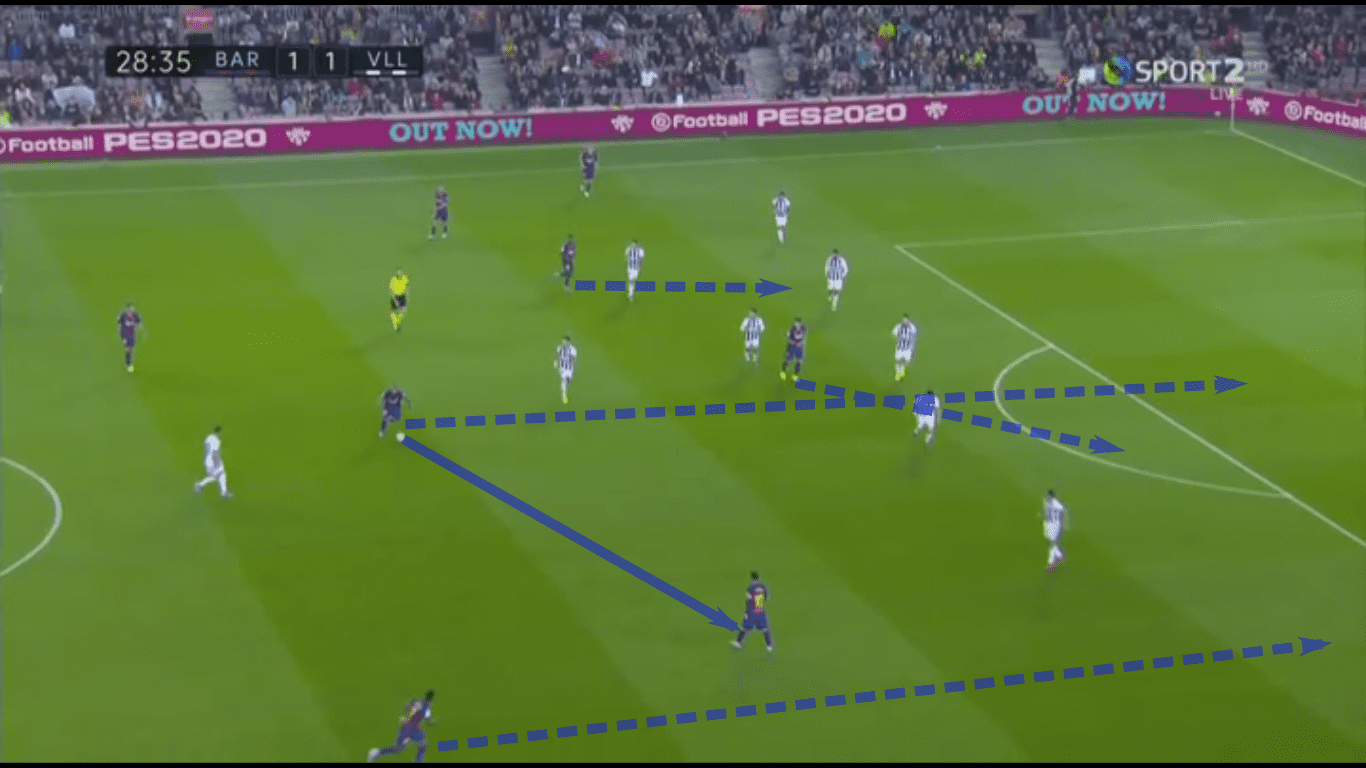
In this instance, Barcelona start this play from Marc-André ter Stegen who sends Barcelona forward to advance into the attacking third via the left-wing in a 4v4. After a throw-in, the ball is played to Vidal, who complete the switch of play to Messi.
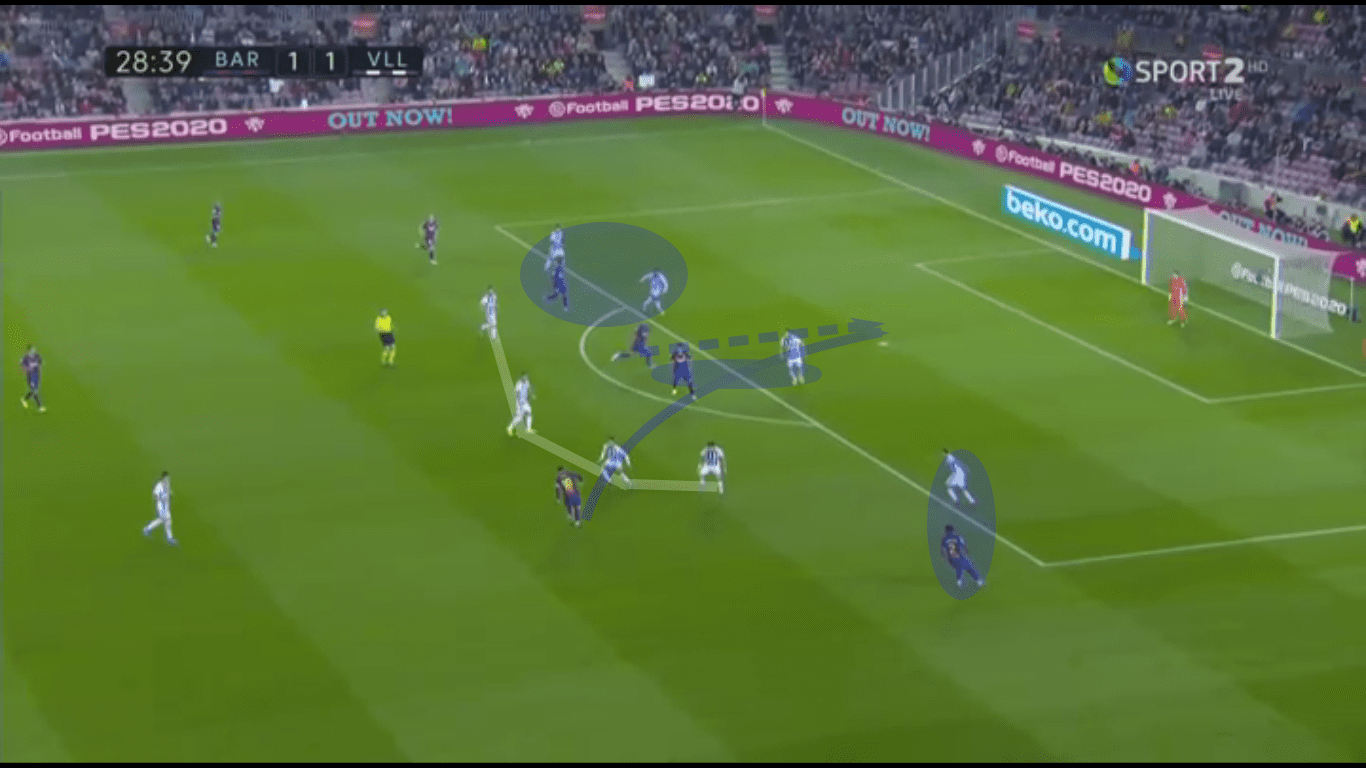
Vidal’s pass finds Messi in plenty of space with virtually no pressure on him. That cues Vidal’s run forward. That tight backline from the first picture starts to show some vulnerabilities. Fati makes his run between Porro and Fernández, Suárez occupies Olivas and Nélson Semedo pulls Barba wide. That leaves the midfielders to track Vidal’s deep run.
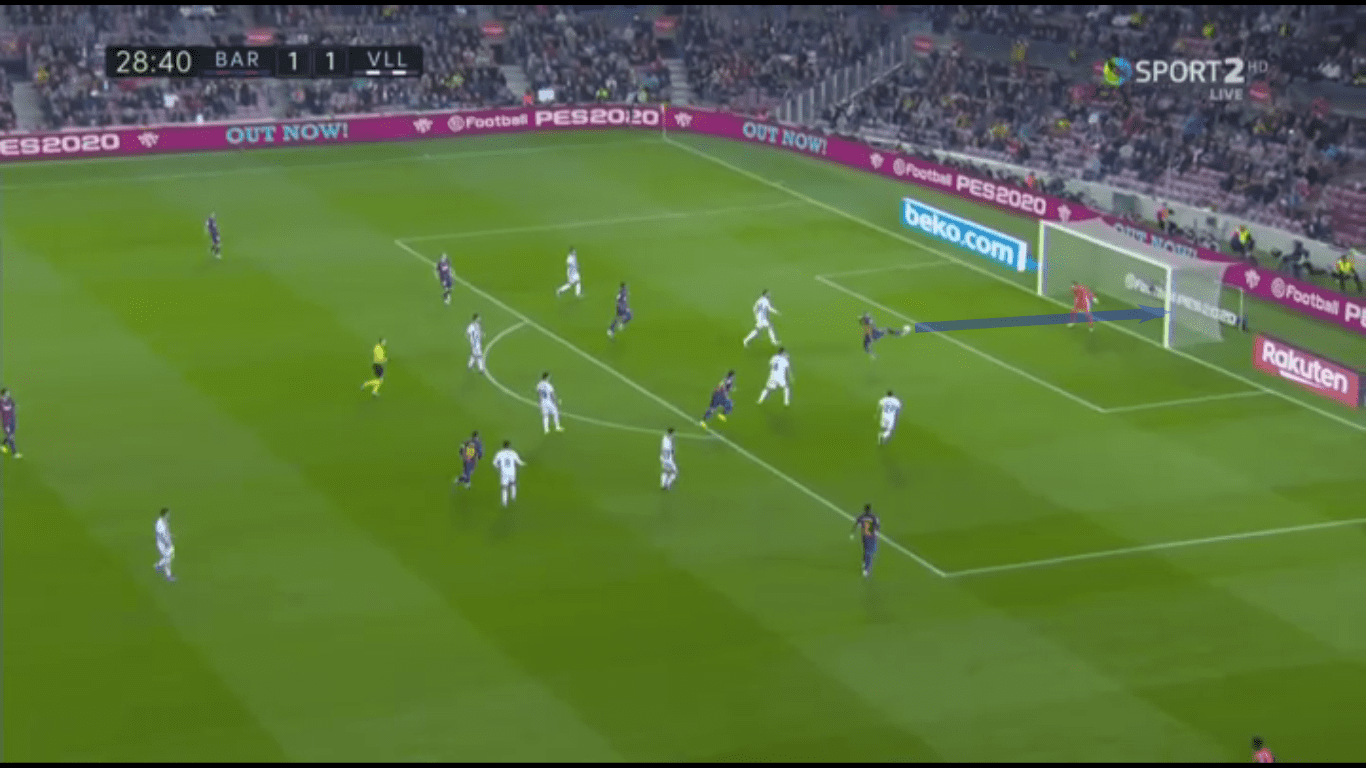
Vidal slices right through them, completely untracked. He makes a brilliant lunge to latch onto Messi’s chip, volleying the ball into the net.
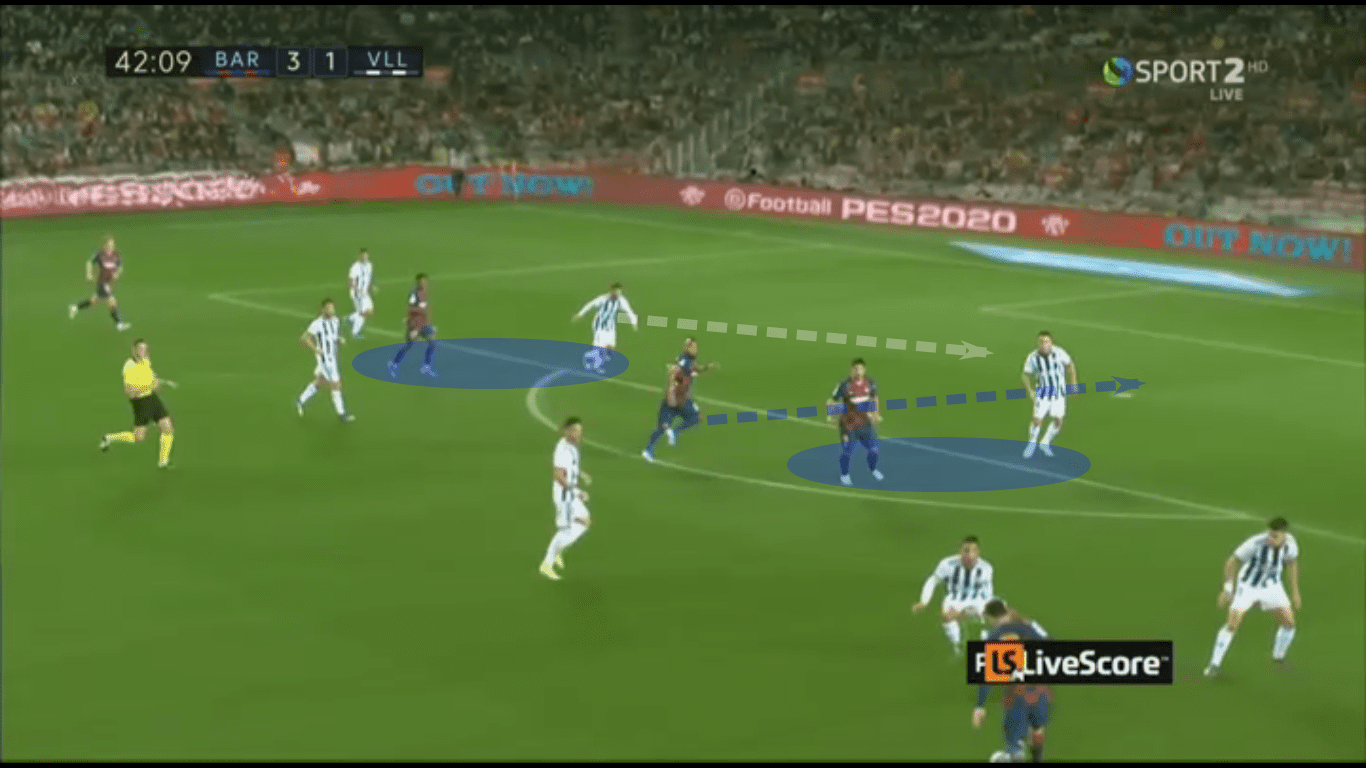
As you can see from this angle, Fernández is the only player watching Vidal. Since Fati’s threatening position demands his attention, Fernández is far too late to catch Vidal. Notice the Valladolid midfield is in the general vicinity of the ball, but none of them bothered to really pressure Messi or track Vidal. Messi had plenty of time to wait for Vidal’s run.
Real Valladolid’s stagnant attack
Valladolid spent most of the game defending in their own half. One would assume that when opportunities to play direct emerged, the away side would take those chances. On the game, Valladolid attempted just eight counterattacks, three of which ended in shots. That’s good for a 37.5% success rate.
Throughout the game, Valladolid was reluctant to turn over the ball, possibly in fear of a Barcelona counter-attack. Their passing percentage of 81.7% is quite good, but also an indication that there was some reluctance to take the necessary risks to break Barcelona’s lines.
In fairness, Valladolid was forced to drop deep very often, so the two outlets up top tended to disappear and the wide outlets were narrow. Quick combination play and the dribble were often the only way out of pressure. However, sitting deeper doesn’t mean you have to play direct every time you win the ball. Identifying and exploiting the right opportunity is the key.
That’s where Valladolid really struggled. Overlooking opportunities to hit the high targets, Valladolid was content to play the shorter, safer, non-penetrating ball. Even in instances when numerical superiority was achieved, service never reached the runners. The backline effectively made the game more difficult for themselves by allowing Barcelona to keep tight lines. Had Valladolid skipped the midfield more frequently, especially when Barcelona was out of position, the midfield would have offered more support in the attack.
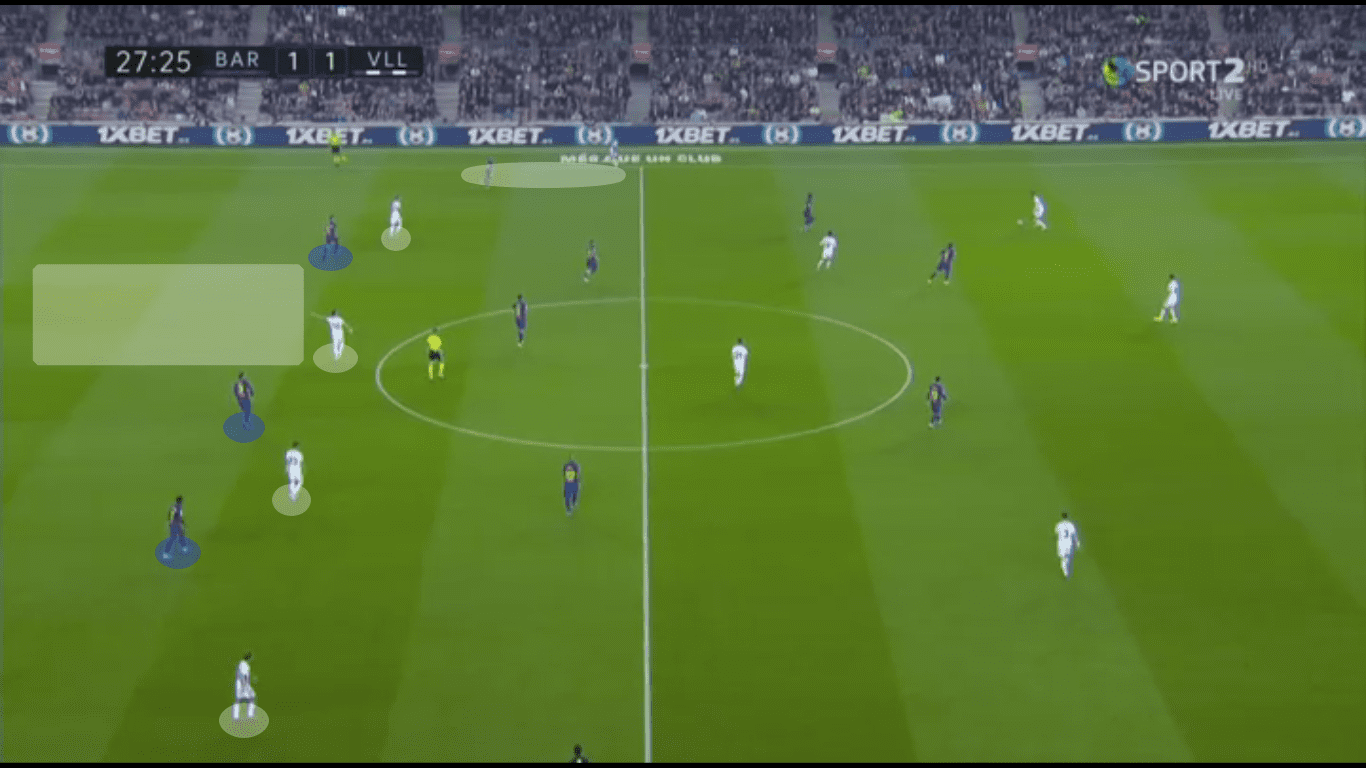
Here you see Alba in the wing to track Porro, Valladolid had four players in line with the remaining three Barcelona defenders. Fernández had plenty of time to pick up his head and spot the numerical superiority, as well as Plano’s outstretched arm, but he opted to play short.
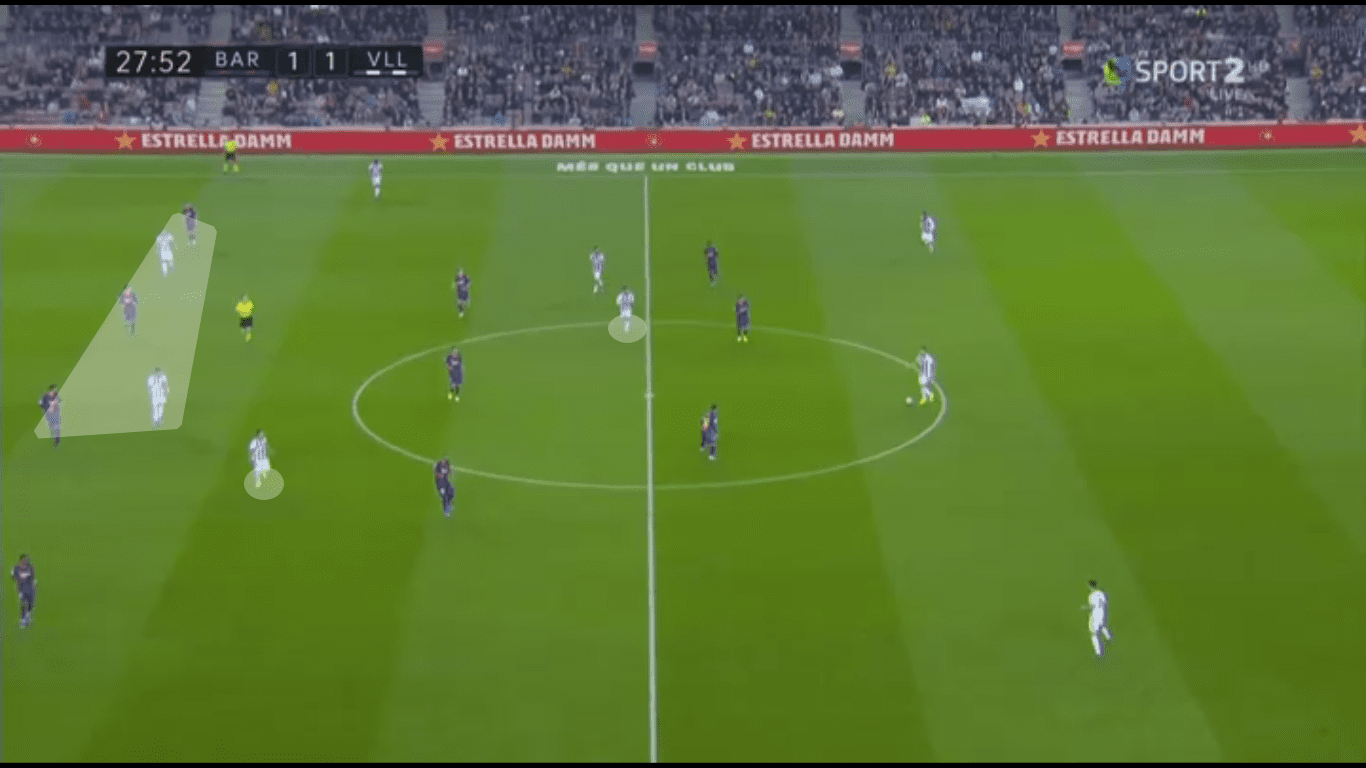
Moments later, Valladolid has two forwards pushed up high commanding the attention of the defence and a man between the lines. Rather than risking the penetrating pass through Barcelona’s two blocks of three, they play the safe ball out wide.
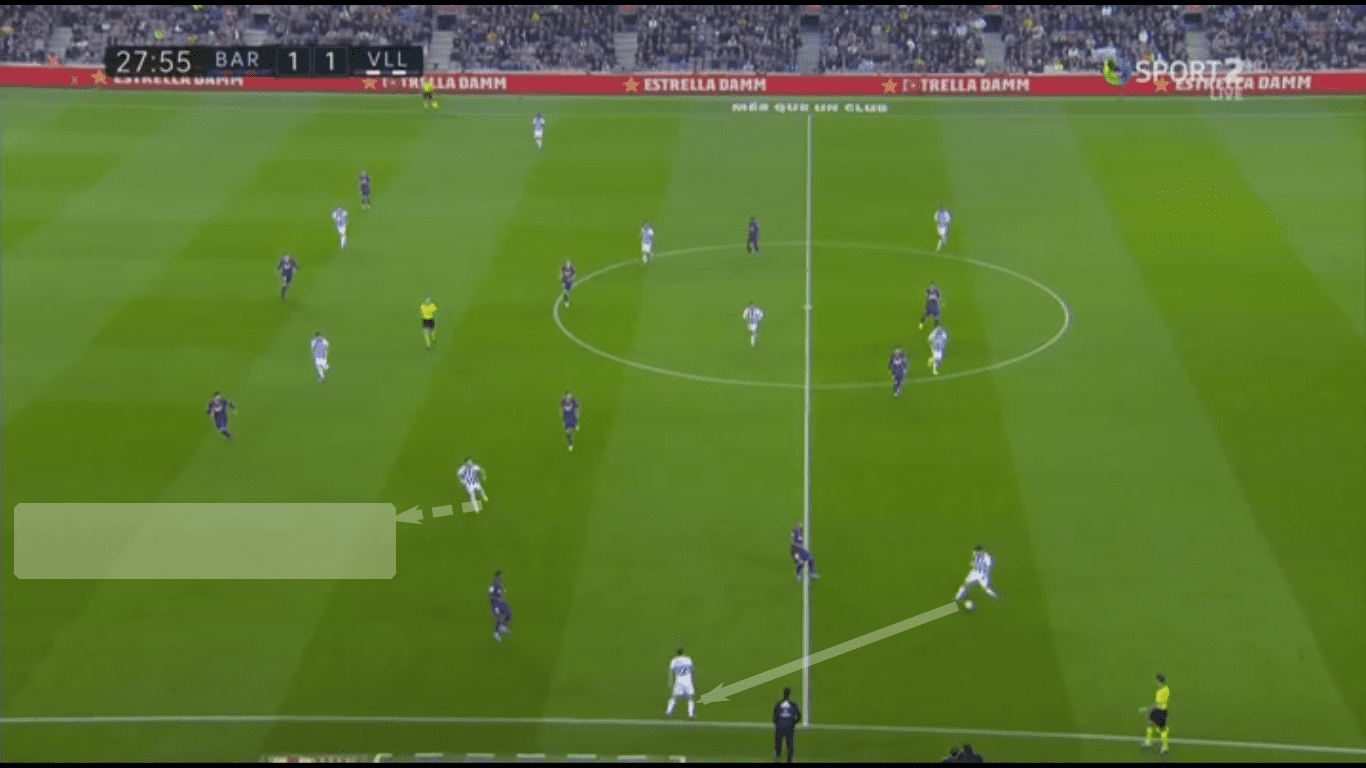
With Semedo sliding towards the touchline, there is certainly an opportunity for a high-reward penetrating pass. Valladolid bypasses another opportunity for progression as a tight angle again leads to a safe wide pass.
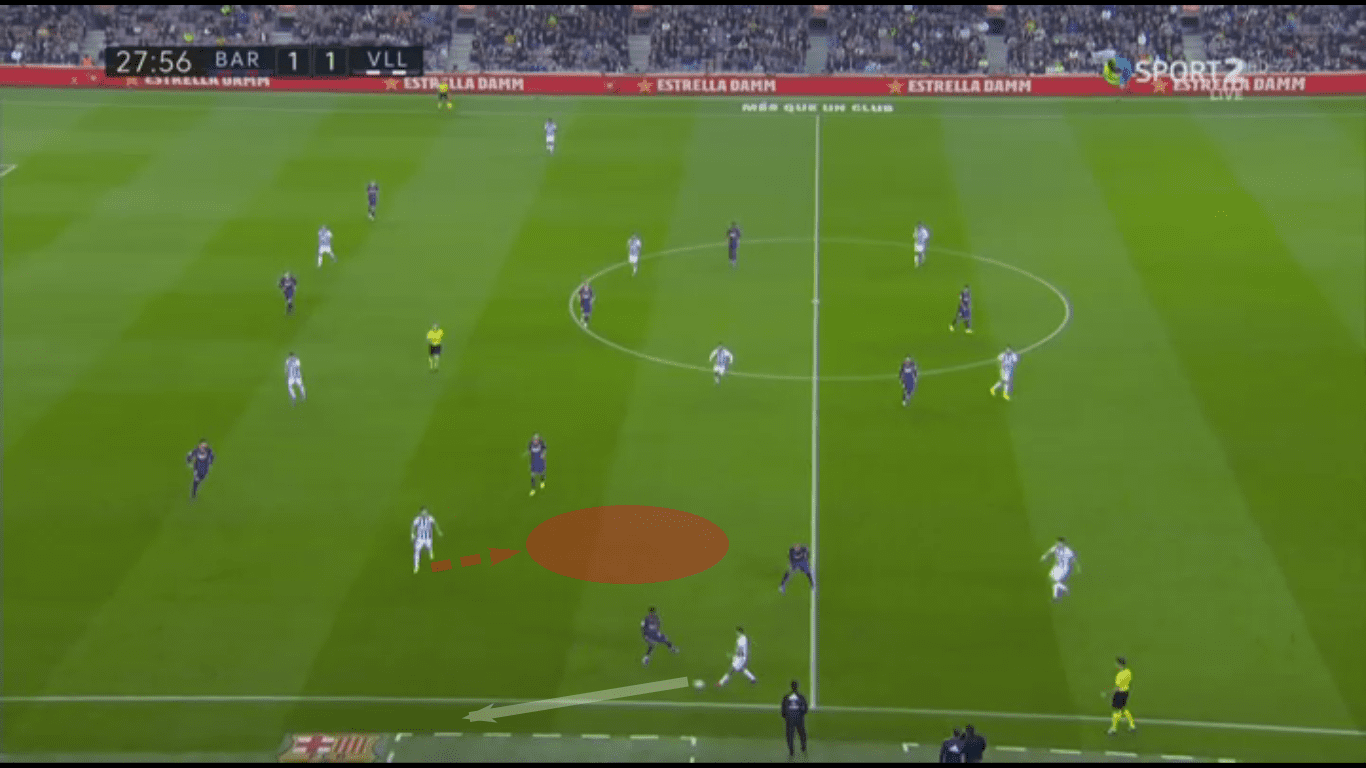
Once Nacho receives the ball out wide, he makes a mess of his delivery, putting the ball out of play for a Barcelona throw-in. That said, he was played into a poor area with a tight angle. The probability of success for a ball played down the line was always low. Rather than a run down the line, he needed Rubio to check back. That simple action would have created a better passing lane and opened up the wing for Nacho’s run on the return pass.
Barcelona’s untracked runners find the gaps
Though he only scored once, Suárez was an absolute nightmare for the Valladolid defence. His runs in behind the line and consistent occupation of two defenders created massive gaps for his teammates. With Suárez typically drawing the attention of two defenders, Fati and Messi successfully pulled the other three away from the other Barcelona attackers.
Alba operated high up the left-wing, de Jong was instrumental in the build-up and Vidal was virtually contested in the midfield. Barcelona was especially productive on the left-wing. Given their quality, Barcelona looked comfortable progressing in situations of numerical superiority and equality. Once Valladolid committed enough numbers to wrestle back numerical superiority on the wing, Barcelona played out of pressure.
Negative passes and switches of play wreaked havoc on the defence. Though Valladolid looked composed and structured as the team adjusted its shape, Barcelona successfully manipulated the recovery movement to open gaps. With the switch of play or negative pass, the forwards tried to occupy at least five defenders. When the forwards checked into the midfield, at least one defender went with them, creating a central running lane for a teammate.
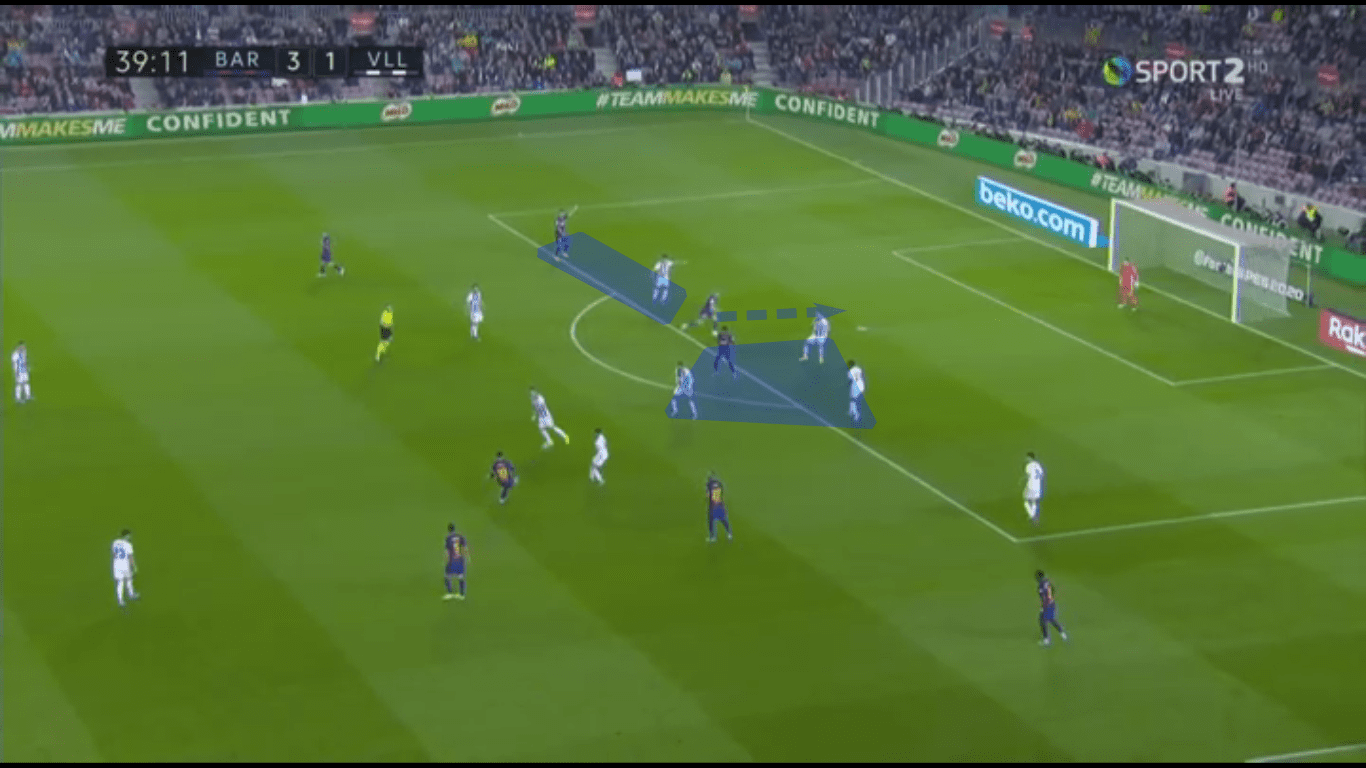
You’re probably looking at the above picture thinking this is a case of déjà vu. Rest that this is simply another instance of Messi having loads of space on the ball looking to bend a pass over the Valladolid defence. In this instance, the cross is blocked and Valladolid managed to cover the middle of the field. However, you can see Messi’s central target. This is more a case of Messi missing the target than Valladolid defending well.
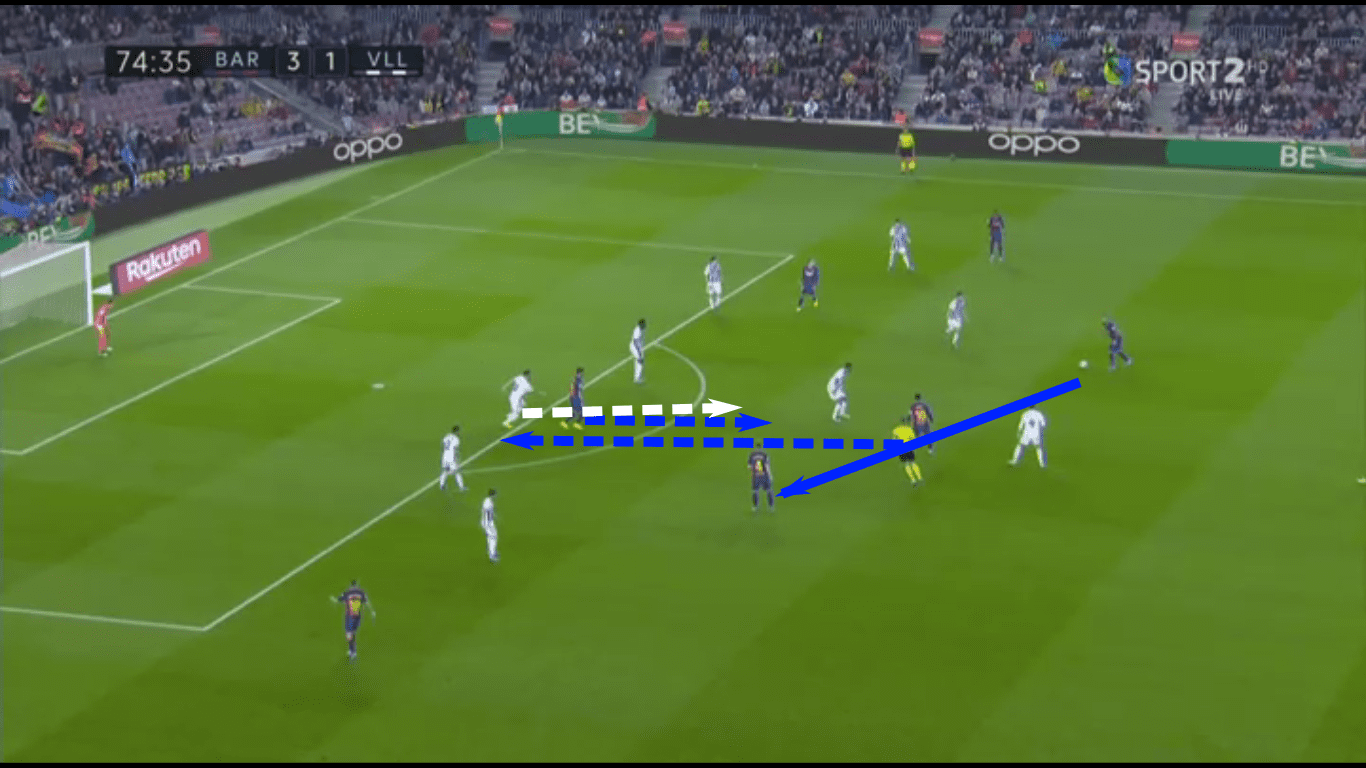
Late in the second half, Suárez does well to pull his defender into the midfield. Messi’s watching that development closely. The moment Suárez successfully clears that space, Messi makes a hard run into the area.
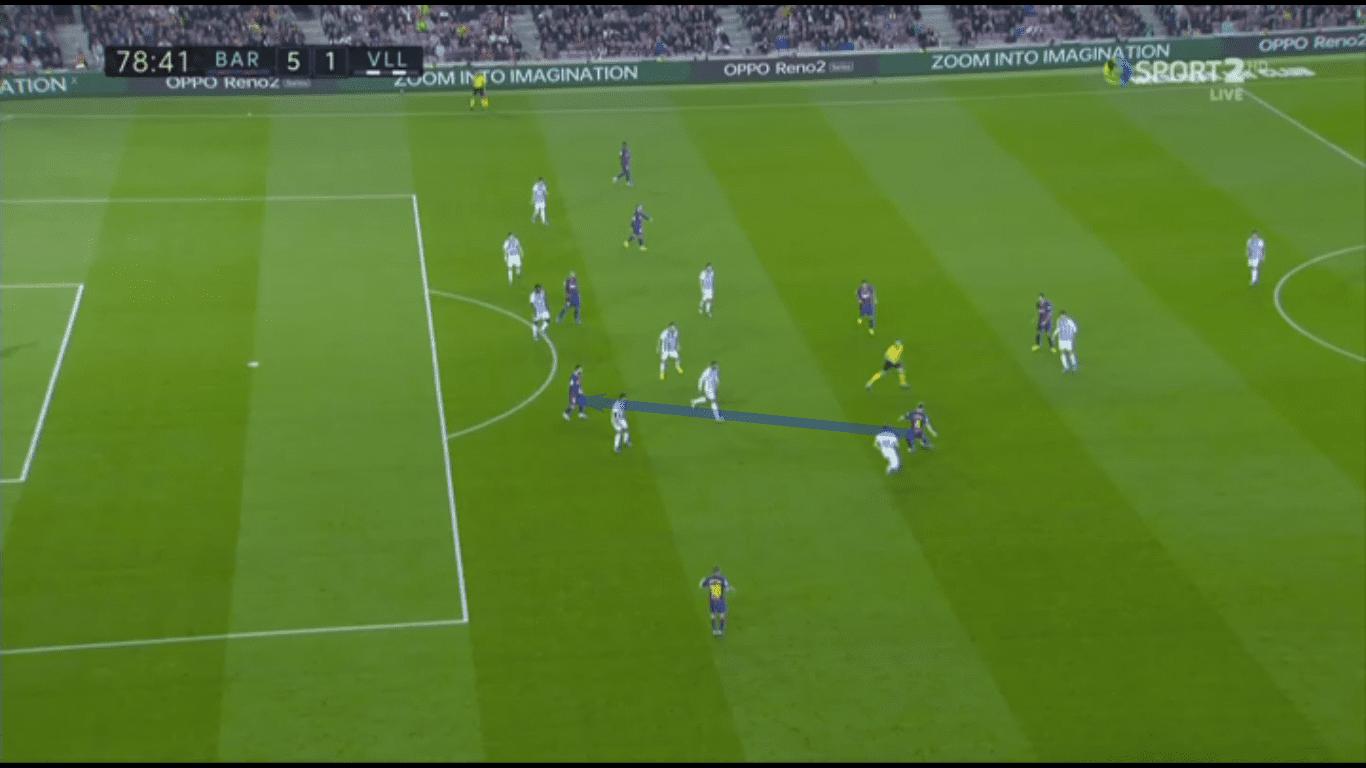
Since the ball is played to Ivan Rakitic, Valladolid lost track of Messi. Rakitic plays a lovely bent ball over the Valladolid defence into Messi. The talisman controls it and unleashes a fantastic half-volley to give Barcelona a 4-1 lead.
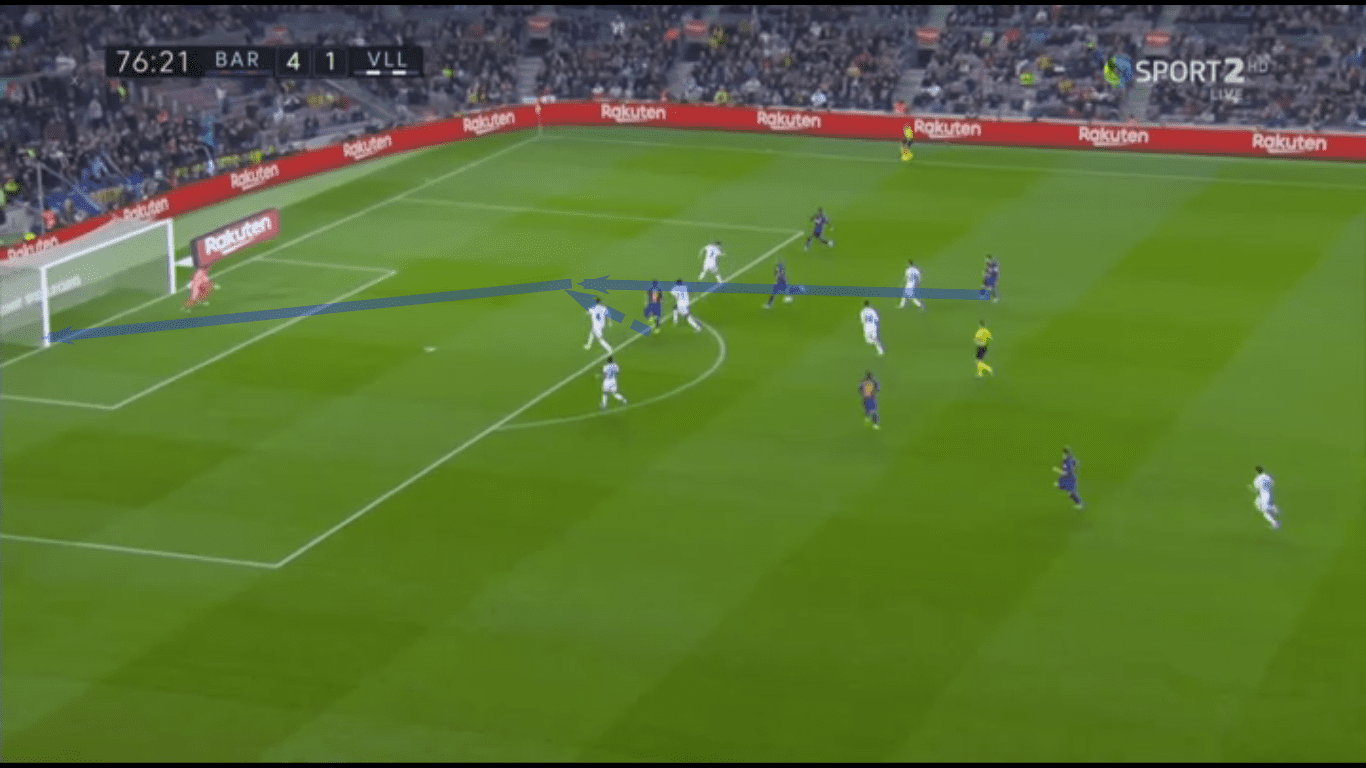
Moments later, Barcelona made it 5-1 when Messi played in the run of Suárez. With all eyes on Messi, Valladolid lost the run of Suárez, which allowed him to run in behind and supply a lethal finish.
Conclusion
Valladolid wanted to control Zone 14, Barcelona was able to manipulate the back three’s shape, often creating seams through the middle. With better pressure from the midfielders, Valladolid might have fared better, even if only keeping the scoreline closer. González’s men will hope for a better outcome on Sunday when they face NBA legend Steve Nash’s Mallorca.
Meanwhile, Barcelona’s win puts them top of the table, finally overcoming the surprise contenders, Grenada. Valverde’s team will look to retain that top spot Saturday against Levante and before aiming for a better performance against Slavia Prague when the Czech side arrives at the Camp Nou on Tuesday.
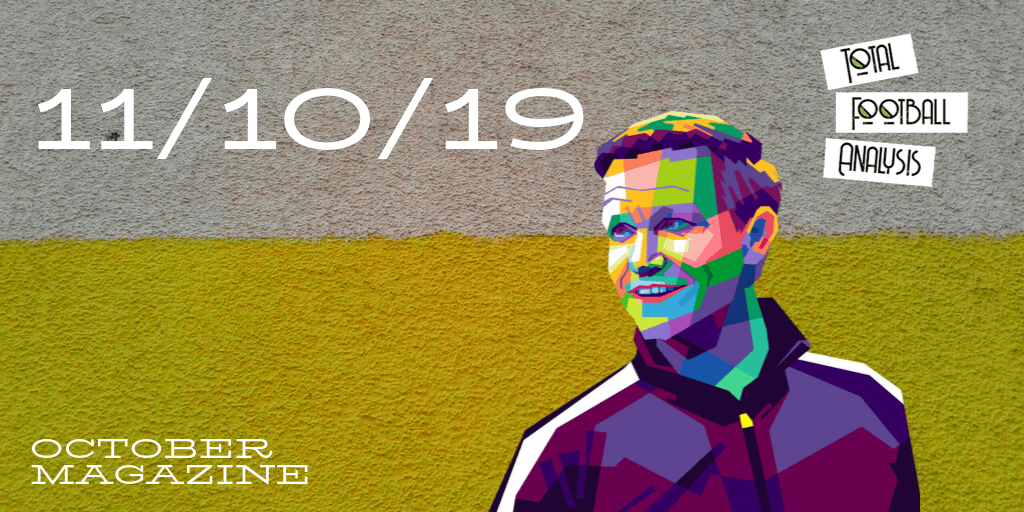
If you love tactical analysis, then you’ll love the digital magazines from totalfootballanalysis.com – a guaranteed 100+ pages of pure tactical analysis covering topics from the Premier League, Serie A, La Liga, Bundesliga and many, many more. Buy your copy of the October issue for just ₤4.99 here





Comments